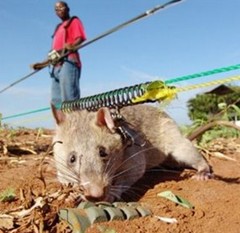 One of Microkhan’s most faithful correspondents wrote in yesterday regarding our recent Taiwanese landmines post. Our piece quoted from a report on Mozambique’s mine removal program, which suggested that dogs were doing much of the detection. But our reader, who obviously knows Mozambique better than the Average Joe, points out that giant pouched rats are sharing much of the detection burden. (Video here.) And should you be so inclined, you can even pony up to adopt one of the heroic critters.
One of Microkhan’s most faithful correspondents wrote in yesterday regarding our recent Taiwanese landmines post. Our piece quoted from a report on Mozambique’s mine removal program, which suggested that dogs were doing much of the detection. But our reader, who obviously knows Mozambique better than the Average Joe, points out that giant pouched rats are sharing much of the detection burden. (Video here.) And should you be so inclined, you can even pony up to adopt one of the heroic critters.
This revelation got us thinking about the historic cost-benefit tally for the genus Rattus. Granted, they’re notorious disease spreaders—though, as we’ve previously explored, there’s an outside chance they may have gotten a bum rap on that whole Black Death thing. But you’ve got to balance the bubonic plague against the vermin’s role in medical research—and, back in the ol’ days of King Coal, their role in saving countless miners’ lives. From the October 19, 1889 edition of The New York Times, in which the run-up to a Pennsylvania mine disaster is recounted (PDF):
Suspicions were aroused a few days before the accident occurred by the queer conduct of the mine rats. They were very numerous in the Archibald Mine, and for several days precious to the falling of the roof ther were seen quitting the place in swarms. This the old miners considered a bad omen, because they had learned from experience and tradition that when rats leave a mine, it is a certain sign that an unusual accident is about to occur.
The belief in this particular notion is quite general throughout the coal fields, and repulsive as the great, fierce mine rat is to the miner, he likes to see it at ease in the dismal depths where death is of such frequent occurence. There is good reason for associating the disappearance of the rat from a colliery with an impending disaster. The rat is a sensitive thing; it makes its resting place in the nooks and crannies of the mine, and it feels the first slow movements of the crumbling rocks as they begin to squeeze and settle and shape themselves for the disaster which culminates in the fall of roof.He is dazed by the grinding motion of the rock, he undoubtedly thinks they have suddenly become imbued with life, and he flees with his fellows, panic-stricken from the place.
A prime case of one species’ selfishness benefitting another. And yet we still abhor the rat, primarily due to a childhood trauma involving a trash can. We’ll leave the rest up to your imagination.


Jordan // Jun 4, 2009 at 12:23 pm
I’ve also heard from my friends who use rodents in research that rats are a lot nicer to work with than mice. For instance, rats are much less likely than mice to bite you.
Brendan I. Koerner // Jun 4, 2009 at 1:13 pm
@Jordan: Hmmmm, interesting. Am I correct in assuming that rats are “smarter” than mice? (I’m assuming that intelligence here is defined as ability to solve very basic problems, and/or learn repetitive tasks.) If so, perhaps they’re better at learning that attacking their owners is ultimately counterproductive.
Then again, I realize that lab rats and the ones eating the garbage outside my apartment are sorta different beasts.
Jordan // Jun 5, 2009 at 10:29 am
There are some big differences between lab rats and the ones outside your apartment. For one, the urban rats are much less likely to have allergies:
http://www.scienceblog.com/cms/wild-vs-lab-rodent-comparison-supports-allergy-hypothesis-10825.html